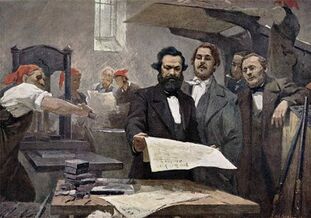Class struggle
"The history of all hitherto existing society is the history of class struggles. Freeman and slave, patrician and plebian, lord and serf, guild-master and journeyman, in a word, oppressor and oppressed, stood in constant opposition to one another...."
In Marxist historiography, class struggle is regarded as the primary motor force of history. Class struggle has existed for as long as class society has existed, when a privileged socioeconomic stratum was able to exploit the surpluses of those beneath them, thus partly or wholly emancipating them from the requirement to work in order to subsist. As a result of the different relations to the productive forces and exploitive nature of class society, the exploited and exploiters developed contradictory material interests, which would mature mutually antagonistic relations to the other, eventually resulting in revolution or another qualitative change in society.
In Marxist theory, it is understood that the primary form of class struggle under capitalism is one between the bourgeoisie and proletariat. Following the intensification of class struggle both before and after a proletarian revolution, society will mature into the higher stage of socialism, also known as communism, where will class distinctions between the proletariat and other classes will become non-existent, thus eliminating class struggle.
Distinguishing characteristics
Distinguishing characteristics of class struggle under capitalism include:
- Labour (the proletariat or workers) includes anyone who earns their livelihood by selling their labor power and being paid a wage or salary for their labor time. They have little choice but to work for capital, since they typically have no independent way to survive.
- Capital (the bourgeoisie or capitalists) includes anyone who gets their income not from labor as much as from the surplus value they appropriate from the workers who create wealth. The income of the capitalists, therefore, is based on their exploitation of the workers (proletariat).
- At this stage, production itself becomes a social enterprise.
